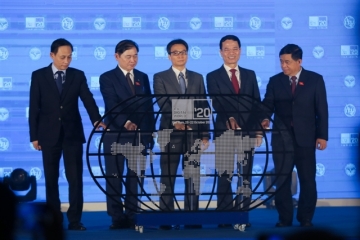Vietnam is now a hotbed for venture builders

Three venture builders in Vietnam with different strategies. Image: Andrew Rowan
Well, according to Cushman & Wakefield, earlier this year Vietnam became the top destination in the world for outsourcing for the first time ever. Today, Vietnam-based companies perform quality assurance and content/brand moderation, for well-known American companies such as HBO and AOL.
Every day, western consumers interact with social media accounts operated by global brands, resulting in hundreds of millions of pieces of content that are created each month. Somebody has to filter that newly-posted content for brand standards, often in real-time. On the other side of the world, a unit of more than 100 Vietnamese workers at Sixth Gear Studios, an IT outsourcing and software development company in Hanoi, Vietnam’s capital, goes through fresh content on platforms such as Facebook and Instagram twenty-four hours a day. However, the leadership of this and other Vietnam-based companies are exploring new ways to generate value beyond purely business process outsourcing (BPO). In other words, some of those same companies that have traditionally fulfilled outsourcing requirements have begun setting sights on developing their own homegrown projects and startups—and a new hybrid breed of venture capital-backed developers have emerged into the local market.
At Sixth Gear Studios, the BPO team works around the clock to moderate global content, most of which originates from the United States and Europe. But in the future, founder and COO Hubert Choi plans to develop his company’s own proprietary technology to automate more processes (and consequently attempt to transition those affected workers to handle tasks that are higher up the value chain). At the same time, Sixth Gear Studios plans to expand its near-term focus to include venture building, having just moved to its new headquarters—that has a decidedly “Silicon Valley” feel—to facilitate the growth of this new division.
For those who are unfamiliar with the term, venture building is the development of a startup using an existing company’s own technical team and resources to do it in-house. The process usually involves brainstorming and developing an idea or concept into a product or service, and eventually a business. (Or taking an existing idea and executing it.) The Minimum Viable Products (MVPs) that gain traction are then run as startups in a unit within the main company or as a subsidiary—or at least that is the goal for Choi and his team in northern Vietnam.

Sixth Gear Studios’ new headquarters in Hanoi, Vietnam. Photo: Sixth Gear Studios
Part VC and Part Developer
In the southern city of Ho Chi Minh City (and the center of economic activity in Vietnam), there is already a venture builder that is leveraging Vietnamese talent. Locally known as 8 Bit Rockstars and managed by entrepreneurs Joseph Ziegler and Lars Jankowfsky, .NFQ Asia (as the company is known internationally) is located in District 1’s Vincom Center and is expected to ramp up quickly in the next three-to-six months to 30 developers from its current roster of five developers. These developers will have the primary task of building and developing the technology for funded startups, including one of legendary entrepreneur and investor Peter Thiel’s projects.
Ziegler, who settled into Singapore after living in Australia and South Korea, decided with Jankowfsky on expanding .NFQ as an innovation center and venture builder in Ho Chi Minh City (they have an existing office in Lithuania with approximately 250 developers) due to the belief that that Vietnamese “have a real entrepreneurial spirit and mad tech skills,” according to Ziegler.
“It’s a hot market for development with access to smart people that are passionate—.NFQ understands the importance of culture and produces results in return. I want to bring the value of Vietnam as a high tech center/innovation center to the world and combine it with smart investing. Furthermore, .NFQ has a history of investing into people and teams to create the kind of environment that attracts the best developers,” said Ziegler.

8 Bit Rockstars’ office in Ho Chi Minh City, Vietnam. Photo: .NFQ Asia
While Vietnam has a growing number of technically-skilled workers (in IT and high-tech manufacturing) with low salaries (in addition to domestic migrant workers), these forms of human capital are not sustainable competitive advantages in the long run as local wages increase over time and Foreign Direct Investment (FDI) runs the risk of shifting to places with even lower wages (the rest of Indochina and perhaps Africa on the horizon). So Vietnamese IT outsourcing firms with excess capacity are presented with the opportunity to use their underutilized resources to develop MVPs internally or with external local or international partners. Or these companies can just become investors themselves in order to attract founders with suitable ideas: FPT, a leader in outsourcing in Vietnam, announced the creation of FPT Ventures this past May. It will provide approximately $3 million in seed and early stage funding (as well as technical resources) to Vietnamese startups with a minimum investment amount pegged at $50,000. Thus, FPT can become more involved in the creation of value-added products and services in order to capture a larger piece of the lifetime value of a startup in the local market; already FPT has been testing the venture-building model with some its internal projects, allowing the conglomerate to explore different areas to innovate in.
Creating Sustainable and Scalable Value
In the short term, IT outsourcing will increase in Vietnam and the shift to using Vietnam as a place to develop MVPs and prototyping in general will also attract the interest of local and regional operators, as well as entrepreneurs from the west (who can’t compete with local wages or local market knowledge, but can build MVPs for their markets back home—perhaps even more efficiently than doing it in their home markets since the dollar/pound/Euro goes further in Asia). Sixth Gear Studios, FPT Ventures, and .NFQ Asia all have slightly different approaches when it comes to venture building but the net effect is that risk for executing startups is lower across the board when utilizing a version of this model—and it will largely be Vietnamese engineers who will build and integrate new technologies to be launched in Vietnam, the region, or in a market on the other side of the world.
Farther out, it will be Vietnamese-led innovation and ingenuity (partially in the form of venture building or developer skills gained from it) which will propel the local economy forward as Vietnam becomes more integrated into the global economy, and in turn faces more direct regional and global competition in the form of ASEAN integration and upcoming Free Trade Agreements (FTAs). For now, Vietnam-based outsourcing companies are in the position to build BPO automation technologies and to experiment with venture-building models themselves since they are currently at the forefront of the global IT outsourcing industry (and they have the experience, talent, and entrepreneurial mindset to do so)—whether or not they capitalize on these transformational opportunities remains to be seen.
Andrew Rowan (Techinasia.com)




